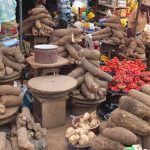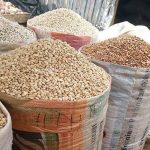A miscalculated bet on the rising cost of beans has left many local speculative traders counting their losses, as the commodity’s price has plunged unexpectedly, wiping out anticipated profits.
The traders had stockpiled large quantities of beans earlier this year, hoping to sell them later at higher prices. But the market has not gone as predicted.
Between January and February, a mudu of beans sold for as high as ₦3,000 to ₦3,200. Expecting prices to climb further, many traders bought and stored large volumes. However, the current market survey shows a sharp decline, with beans now selling for as low as ₦1,800 to ₦2,000 in some markets across the Federal Capital Territory (FCT), Abuja.
One trader said she took a loan from her cooperative to buy beans, but the current prices have left her struggling to repay it.
“Last year, beans were very expensive. I had hoped that the price would continue to go up, so I took a loan and stored some. But now, wholesalers are selling for ₦2,000 or less,” she said. “I’m not even hoping for profit anymore. If I can recover my capital, I’ll be grateful.”
Another trader at the Garki Modern Market expressed similar concerns. “I bought five bags from Zuba and Keffi, thinking the price would skyrocket due to scarcity. But prices dropped. I won’t even recover half of my cost,” he said.
He added that the current price crash may discourage farmers from planting beans this season. “They may not prioritise beans cultivation, and if that happens, we’ll see the price go up again later in the year.”
Farmers are already considering their options. A member of the Small Scale Women Farmers Organisation in Nigeria (SWOFON) said that if the trend continues, there will be less beans farming this year.
“Most farmers rent their land. If they’re not making a profit, they may switch to other crops. Still, I urge farmers not to give up. What doesn’t favour you this season may favour you next time,” she said. She also appealed to the government to subsidize inputs like pesticides, citing rising insecurity and high costs as barriers.
Arc Kabir Ibrahim, president of the All Farmers Association of Nigeria (AFAN), attributed the price drop to weakened purchasing power. He noted that beans were not included in the import waiver granted by President Bola Tinubu in 2023.
“Many households can’t afford a mudu of beans, and that has dragged prices down,” he explained. However, he predicted that prices may rise again by August.
“The price crash might hurt farmers, but it’s part of the general trend across commodities. The key is value addition—processing beans into other products can help reduce losses and improve shelf life,” he added.










